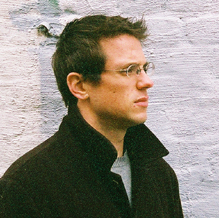 Tuesday, January 18, 2005
Tuesday, January 18, 2005
Sellout
Jerry's post about the violinist Nicola Benedetti, who might sell more albums based on sex appeal rather than her talent as a musician, raises an important question: What is our goal as musicians? To sell albums or to make art?
The answer to this question would probably vary depending on who was asked. Posed to the artist, I'm pretty sure the answer would be the latter. But directed at the president of a big-name record company, I bet the answer might be different. And probably at odds with his or her artists' aims.
To her credit, Ms. Benedetti seems to understand the possible ramifications of her recent deal--her spokesman Ian Roberts issued the following statement: "Nicola wants to keep to her core of classical music, but modernise without losing standards." And just what would happen if she began to lose her standards? Well, she'd run the risk of being branded a "sellout" by both peers and critics, if they haven't already made that judgement.
The music business has it's fair share of these artists, and each instrument can most likely claim at least one. Among saxophonists, Kenny G as long been the bearer of this burden (all the way to the bank, I might add!). The truth is that many of these so-called "sellouts" are fine musicians, Mr. Gorlick included. They've simply chosen a path in music that might be a bit more lucrative than the path that you or I have chosen.
But the issue then becomes the hype or overhype surrounding the artists. This is precisely why Anthony Tommasini wrote such a scathing review of Lang Lang's Carnegie Hall recital in The New York Times. Because Deutsche Grammophon had built up such expectations about the event, who can fault Mr. Tommasini for his reaction when, to his ears, the performance didn't live up to the hype?
Performers and composers want to make music and share their art with the public. Record companies want to sell albums. In a way, these two goals are quite similar--at their core they both are about allowing people to enjoy music. Yet they couldn't be more different. Is there a way to bridge the gap between these competing aims or perhaps just create more common ground?
posted by Brian Sacawa
1:38 PM
|
|
 Praised by The New York Times as "an inventive musician . . . fresh and surprising," saxophonist Brian Sacawa has firmly established himself as an important contemporary voice for his instrument. He is active as a soloist, recitalist, and chamber musician throughout the United States and is the co-founder of the new music duo Non-Zero with percussionist Timothy Feeney.
Praised by The New York Times as "an inventive musician . . . fresh and surprising," saxophonist Brian Sacawa has firmly established himself as an important contemporary voice for his instrument. He is active as a soloist, recitalist, and chamber musician throughout the United States and is the co-founder of the new music duo Non-Zero with percussionist Timothy Feeney.
He has given premieres of over thirty works by both established and emerging composers, including Michael Gordon, Bright Sheng, Andrew Mead, Oliver Schneller, Ken Ueno, Beata Moon, Hillary Zipper, and Scott McAllister, among many others. Named the Baltimore CITYPAPER’s Critic’s Choice for Classical Music in 2002, he is the recipient of awards for solo performance from both national and international competitions.
Sacawa's versatile career has led to appearances with the St. Petersburg Philharmonic, the Detroit Symphony Orchestra, the New World Symphony, Harvard Group for New Music, New Music Brandeis, Bargemusic, and at meetings of the ISU Contemporary Music Festival, World Saxophone Congress, North American Saxophone Alliance, and New England Saxophone Symposium.
Brian holds degrees from the University of Michigan, the Peabody Conservatory, and the University of Massachusetts – Amherst, where he studied with Donald Sinta, Gary Louie, and Lynn Klock. He has recorded for the Equililbrium, Naxos, and BiBimBop recording labels.
See Brian's other blog
Sounds Like Now
| |



